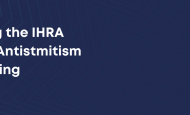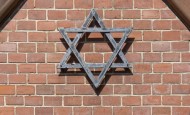[Opinion] What the war over the IHRA definition obscures

[Excerpts]
One of Montreal’s largest synagogues was vandalized and defaced on Jan. 13 with anti-Semitic symbols, including a swastika. The perpetrator was a supporter of anti-Israel boycotts and had been influenced by their propaganda campaigns. A few days earlier, three Israel-linked restaurants in Portland, Ore., were vandalized with “Free Palestine” graffiti. These attacks add to a lengthening list of anti-Semitic incidents around the world, including murderous attacks on synagogues, museums and Israeli institutions, by Jew-haters from the left and the right.
In parallel, an acrimonious and seemingly independent debate is taking place around the working definition of anti-Semitism developed by the International Holocaust Remembrance Alliance (IHRA). This framework was formed by a number of governments in 1998 in response to increasing levels of Holocaust denial and anti-Semitism.
As part of this process, the organization developed a working definition of anti-Semitism, including a number of examples, some of which relate to Israel and the anti-Zionist form of anti-Semitism. These include “denying the Jewish people their right to self-determination,” applying double standards not “demanded of any other democratic nation,” using symbols “associated with classic anti-Semitism … to characterize Israel or Israelis” or comparing “contemporary Israeli policy to that of the Nazis.”
Since 2016, this document has been formally adopted by 30 governments, mainly in Europe, North America and Australia, as well as by international institutions. In addition, a number of parliaments have endorsed the text, and, in many cases, universities and other important institutions use the definition in the form of guidelines for assessing anti-Semitic behavior.
But for some vocal organizations and individuals, the Israel-related examples of anti-Semitism are unacceptable and are portrayed, or distorted, as attempts to “silence criticism” of Israeli policies in the conflict with the Palestinians or even as “threats to democracy.” NGOs at the forefront of the BDS movement, such as Human Rights Watch and Amnesty International, are among the most vocal in attacking the IHRA definition.


